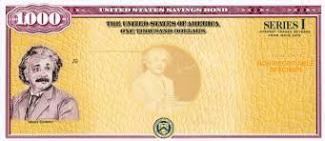
The Time to Buy Series I Savings Bonds is NOW!
Is Now A Good Time to Buy Series I Savings Bonds?...YES!
Over the past couple of weeks, I have received a number of calls from clients asking about whether they should take advantage of the recent leap in the interest rate paid on Savings Bonds. While there are some limitations and challenges to overcome in making the purchases, the short answer is YES, the opportunity to earn north of 8% over the next 12 months on a government-guaranteed savings bond is unique in the current low-interest rate world. However, the deadline for purchasing I-Bonds to lock in the current rates is April 28th. If you do not already have a Treasury Direct account that is linked to your local bank account, it can take a few days to get your account funded, so time is of the essence.
The Safe Investment That Will Soon Yield Almost 10% (Wall Street Journal)
Don't Let Inflation Eat Your Savings. I-Bonds May Soon Pay You 9.6% (CNET-Money)
I Bonds Offer Cash Plan As YIelds Top 8.5% Over Next Year (FA Magazine)
LOGISTICS
Where to Buy: TreasuryDirect.gov
When: The deadline to purchase I-bonds at the yields described in the articles above is April 28th, 2022
Purchase Limit: $10,000 per person (i.e., per SSN)
FAQ
Can I get buy them through my bank or in my brokerage account?
NO. Savings bonds have never been available for purchase in investment accounts and purchases through banks ended years ago. Although savings bonds may be purchased via an election on your federal tax return or via certain employer benefits programs, for the most part, Savings Bonds must be purchased electronically ("Book Entry" form) through the Treasury Direct Website.
Can I Purchase Paper I-Bonds?
The only remaining way to purchase I-bonds in paper/certificate form is to purchase with your tax refund. There is a limit of $5,000 for paper purchases in addition to the $10,000 Book-Entry limit.
Is it easy to set up an account with Treasury Direct?
In my opinion, the answer is, "NO". I found the process and the platform software to be poorly designed and dated. Worse, however, are frequent complaints from consumers about rejected applications due to the inability of the third-party company the Treasury Department uses to validate account information. It is just my opinion.
How long does it take to set up an account?
It took me less than 10 minutes to establish my Treasury Direct account and link my primary checking account. However, it took 3 to 4 days to get the account funded so money is available to purchase the savings bonds.
Can I Buy For My Kids?
You may buy $10,000 for yourself. Your spouse/partern may buy $10,000. You may also buy $10,000 for each of your minor children. Basically, there is a $10,000 calendar year limit per social security #. If you have adult children, they must purchase themselves.
Is There a Catch?
Yes, there are several limitations to keep in mind. Here are a couple of important restrictions to keep in mind (1) You must hold the Savings Bonds for at least 12 months, (2) If you cash in your 12 months within 5 years of purchase, a 3-month interest penalty will be assessed.
Can I Link My Treasury Direct Account to Appear in eMoney? YES.
RELATED READING
Buying Series I Savings Bonds [VIDEO] (Treasury Direct)
Buying Series I Bonds for your Portfolio (TheBalance.com)
What Are I-Bonds? (Forbes)
John H. Robinson is the owner and founder of Financial Planning Hawaii and Fee-Only Planning Hawaii. He is also a co-founder of software-maker Nest Egg Guru.
Securities offered through J.W. Cole Financial, Inc. (JWC) member FINRA/SIPC. Advisory services offered through Financial Planning Hawaii and J.W. Cole Advisors, Inc. (JWCA). Financial Planning Hawaii and JWC/JWCA are unaffiliated entities.
Fee-only financial planning services are provided through Financial Planning Hawaii, Inc, a separate Registered Investment Advisory firm. Financial Planning Hawaii does not take custody of client assets nor do its advisers take discretionary authority over client accounts.
The information contained herein is general in nature. Neither Financial Planning Hawaii nor J.W. Cole provides client-specific tax or legal advice. All readers should consult with their tax and/or legal advisors for such guidance in advance of making investment or financial planning decisions with tax or legal implications.

